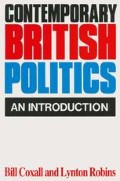Abstract
The communication of political information is an important process in the political system, and the mass media play a central role in this activity. Some political scientists believe that the mass media in Britain help democracy work through allowing a wide variety of views to be expressed. Others believe that the media are anti-democratic because of their power to manipulate the way people think about politics at home and abroad. The media, in other words, are politically biased. This bias, it is argued, results from the fact that much of the media is privately owned and controlled. Added to this, most professional journalists and news managers have a middle-class outlook which they inject into their interpretation of the news and current affairs.
Preview
Unable to display preview. Download preview PDF.
Further Reading
Beharreil, P. and Philo, G. (eds) (1977) Trade Unions and the Media, London, Macmillan.
Clutterbuck, R. (1981) The Media and Political Violence, London, Macmillan.
Curran, J. and Seaton, J. (1985) Power Without Responsibility: The Press and Broadcasting in Britain, London, Fontana/Methuen.
Glasgow Media Group (1980) More Bad News, London, Routledge & Kegan Paul.
Whale, J. (1977) The Politics of the Media, London, Fontana.
Editor information
Copyright information
© 1992 Bill Coxall and Lynton Robins
About this chapter
Cite this chapter
Coxall, B. (1992). The Mass Media. In: Robins, L. (eds) Contemporary British Politics. Palgrave, London. https://doi.org/10.1007/978-1-349-19867-2_14
Download citation
DOI: https://doi.org/10.1007/978-1-349-19867-2_14
Publisher Name: Palgrave, London
Print ISBN: 978-0-333-34046-2
Online ISBN: 978-1-349-19867-2
eBook Packages: Palgrave Political & Intern. Studies CollectionPolitical Science and International Studies (R0)

